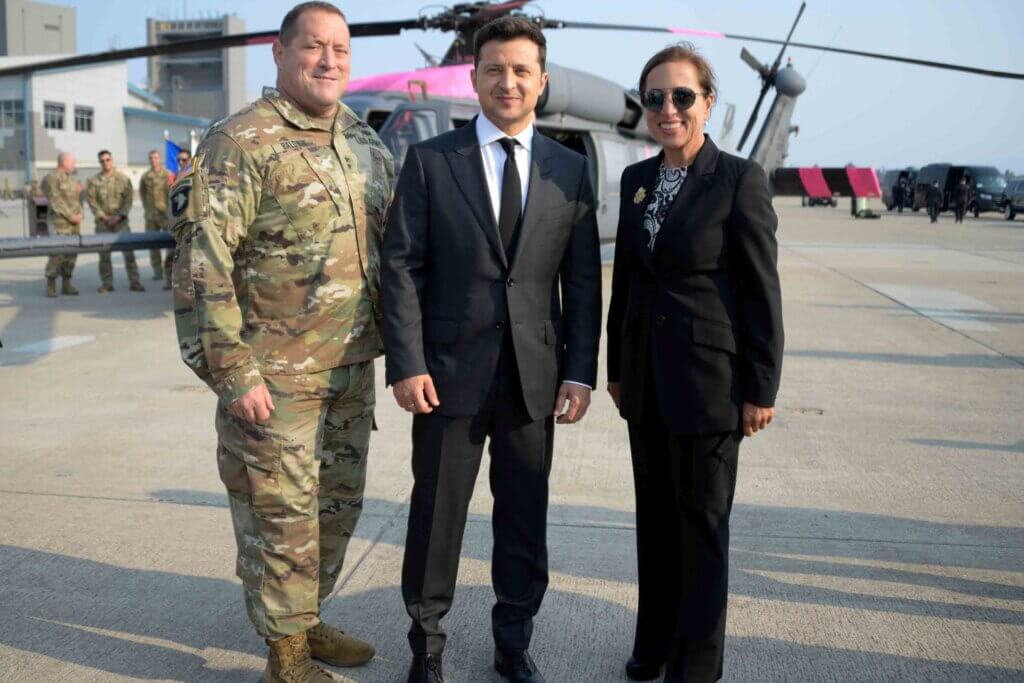As California National Guardsman Lt. Col. Dustin Harris recalled his initial 2023 rendezvous in Poland with members of the Armed Forces of Ukraine, he said that they were standoffish for the first 48 hours or so.
It wasn’t until late into the third day when they all shared a meal that Harris said the Ukrainians finally began to trust them. From there, they shared stories of trauma, photos of their homes that had been destroyed and the overwhelming grief they experienced from it all.
“You could just tell the barriers broke,” said Harris, director of psychological health for the Cal Guard.
Harris was there as part of the Department of Defense National Guard State Partnership Program (SPP), which establishes a military relationship between the National Guard and a partner country’s military forces. The mission was for Cal Guard’s behavioral health officers to assess the mental state of their Ukrainian counterparts.
The Cal Guard has been partnered with Ukraine through the SPP since 1993 and have supported multiple lines of effort over the years, Hill said.
Although the country saw help from other military units and received aid and training after the war began, Harris said the onsite help from the Cal Guard’s behavioral health officers was the first of that kind they had experienced.
“They said, ‘This the first time everyone’s come in and sat and talked with us for a week,’” Harris told Reserve + National Guard Magazine.
“They’re in war, their whole entire country,” Harris said. “We trained them a little bit, but they trained us just as much.”
These days, the Ukrainians are forced to be vulnerable without the respite of breaking bread with their guardsmen friends, as their communications are limited to apps such as Signal, an open-source, encrypted messaging platform.
“They can’t share a lot with us,” Harris said. “The main thing we’re doing is, every couple months or every month, reaching out to them, saying, ‘Hey, we’re thinking of you guys,’ ‘How’s your family?’ ‘How are you doing?’ Things like that is the majority of our conversations right now.”
In this instance and many others, the SPP has slowed down its activity due to the war, but Col. Charles Hill, spokesperson for the California National Guard, said they are still assisting in a variety of ways.
“Due to the war, we cannot conduct traditional in-country events,” Hill said. “We have done some events remotely or met with our Ukrainian counterparts in Poland. Since the Russian invasion, our focus has been on supporting behavioral health and veteran’s support efforts and junior leader development.”
The mission of Harris and his fellow behavioral officers in 2023 involved teaching policies to the Ukrainians, but Harris said their counterparts showed them what they were going through.
“They’re in war, their whole entire country,” Harris said. “We trained them a little bit, but they trained us just as much.”
Harris added that it was one of the greatest experiences for him because his officers and the Ukrainian psychologists they worked with “truly became friends.”
The depth of the relationship is evident in messages from the Ukrainians to the Cal Guardsmen. “When are you guys coming back out here?” they write. “We need you guys.”
Harris isn’t aware of any future return missions, but the Cal Guard continues to help the Ukrainian military work toward building veterans’ affairs resources and addressing ongoing behavioral health issues by building out standard operating procedures.
However, he anticipates that the recovery from war will present an even greater need.
“We’re going to need to be out there a lot more,” Harris said. “Hopefully we’ll be able to get back out there soon.”
Keep up with the how the California National Guard continues to support Ukraine through their Facebook page.

